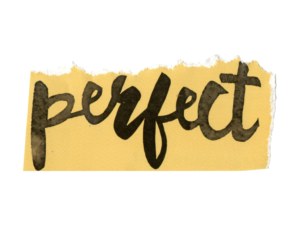In many topics, when we peel away all the layers, we chance upon the familiar face of “perfectionism” at the core of everything. In the performance-driven corporate world where we take pride in constantly pushing for higher standards, not only the self-claimed perfectionists feel the compulsion to have a perfectionist mindset.
The Problems of Perfectionism
- Work-life balance: You cannot stop working on a task until it reaches some level of perfection.
- Confidence Issue Arisen from Self-Criticism: You keep comparing yourself with a perfect image of self who is capable, responsible, resourceful, and perfect in everything, every moment. As you second-guess your thoughts, and your thoughts thus circle yourself, you fail to pick up important information around you while appearing indecisive and slow to act.
- Reluctance to lead: You hold yourself back even from the space you should have claimed. The unconscious framing is “perfection = no mistakes.”
- Becoming a “Harsh” Boss: Even the nicest perfectionists can be critical to others. Perfectionism is the only way they know to make someone improve.
The perfectionism mindset also influences our emotions and motivation:
- Frustration and anger: You can’t help but feel that others (manager or work environment) have failed your expectations – an ideal image of “how things should be.”
- Burnout: You feel withdrawal. You lose hope because you don’t see how that “perfect” outcome has a chance to be achieved.
Is Perfectionist Mindset Key to Success?
Ironically, a mindset for perfection makes us end up in a “lesser” state. This phenomenon repeatedly proves the common belief that “perfectionism makes me who I am – a hardworking person with high standards” wrong.
When thinking of dropping perfectionism, we often fear “becoming complacent.” But who can motivate you in a marathon? A slave driver who keeps reminding you how behind you are? Or someone who cheers you, reminding you of your power to do better?
All people I know report a sense of freedom when they come close to letting go. In this joy of lightness, they are filled with incredible energy to take action, learn, experiment, and unleash creativity. Not at all “complacent” as they’d have imagined.
Two things makes us want to do more and better.
- We are inspired to be better.
- We believe that we can be better.
Perfectionism sets an unrealistic standard. Sometimes, it makes us fall for the self-doubting mantra of “I can do it, I can’t do it, I can do it, I can’t do it….” And sometimes, we become pessimistic that anything can be achieved at all. When we no longer believe we can be better, the high standard ceases to be an inspiration but a distant dream that brings pain, shame, and dreary.
When we compare ourselves to an ideal image: strong, resilient, capable, all the time, how easy is it to say, “I am not good enough?” And when we compare life to an ideal “supposedly” state, how easy can it look grim and hopeless?
We can hold high standards without being critical. We can accept and work with reality while continuing to be inspired to grow, challenge the status quo, and pursue what is worthy.
We don’t have to be a perfectionist.
Unlearning Perfectionism
How can one stop being a perfectionist? We ask this question as if it was something we were born with. It’s worth reminding ourselves that all mindsets are learned. We can unlearn them.
“I am Used to Perfection”
The common belief of perfectionism’s use makes it difficult to dismantle. But how did it even get into us?
Many perfectionists have been high achievers since their school days. They are used to academic success. And in a hyper-structured environment like school, academic success had a name: perfection. Through repeated success, the brain was trained to believe that we can attain perfection if we try hard enough.
Things get tricky when we enter the workforce. The dizzying array of metrics can be overwhelming compared to the singular metrics back in school. The unspoken rules of the game can be frustrating as we miss the transparency in school. As a result, many high achievers are also not very resilient and find setbacks hard to swallow.
Even after leaving school for many years, we still live in the school realm. It takes time and conscious effort to outgrow a system we lived in for many years (especially if we thrived). Peer pressure and approval-seeking are some common marks our school left on us.
Have You Ever Been Perfect?
If you think your past success made you a perfectionist, try asking yourself these questions.
- Have I ever been perfect?
- Do I know any perfect person?
- Has the world ever been that perfect?
- Can I, or anyone, or the world, ever be perfect?
If perfection is not attainable, it’s only fair to let go of it and get rooted in who you are and where you are.
I always love to observe the moment when people embrace this realization. A burden disappears. Light enters. In this new light, we start to appreciate our imperfect selves and the imperfect world; confidence and courage take roots; we embark on a new journey to reality, which we are often farthest from.





